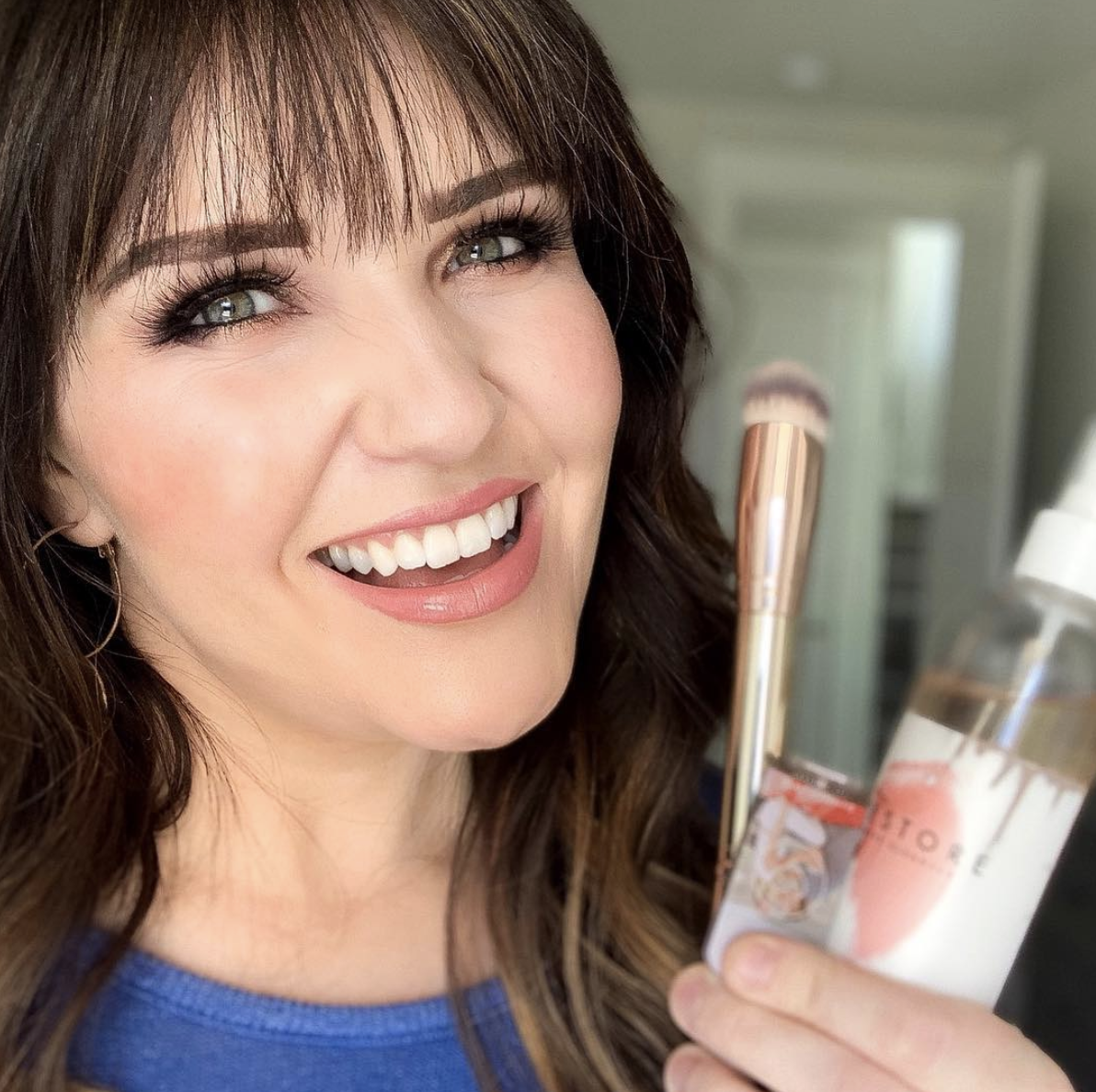I frequently get asked how to use Seint makeup to cover up blemishes. I’m excited to share with you two ways to cover them. It’s not very often that I get those pesky blemishes, but when I do, I either use Seint’s IIID foundation or Seint Demi Correctors. They are both great options, and will do the trick! If you already have the IIID foundation, with a little strategy and intentional placement, you can use the products you already have to conceal any blemish that might come your way. Or, if you want to use less product and neutralize the area instead, you can dive into some color science and use Demi Correctors to make your blemishes all but disappear.
How to Use IIID Foundation to Cover Blemishes
When using IIID foundation to cover blemishes, you will use the darkest highlight shade you have. If you got color-matched by me, I recommend three highlight shades for everyone. The darkest shade of highlight should be used for any areas where you have deeper pigmentation on your face. You can also use it for any kind of color-correcting that’s needed, like under the eyes, blemishes, or melasma. While this might counter what you have traditionally learned about using a lighter concealer for color correction, trust me on this one. The darkest highlight shade is what you will want to use.
GET COLOR-MATCHED HERE
Seint makeup is made to be lightweight and breathable, while still allowing for buildable coverage. As you work with your dark spots and blemishes, these are the areas where you’ll want more coverage. And because you’re building up coverage in those areas, you’ll want to be more intentional about your placement and the amount of product you use.
Application of IIID Foundation to Cover Blemishes
To cover up a blemish using IIID Foundation, I highly recommend using the multi-tasker brush. Begin by dipping the small end of your brush into your darkest highlight shade. Then, gently place the product directly on top of the blemish. The darkest, most pigmented part of the blemish will be at the very center of it. So you’ll want to apply more product to that area, and then lightly blend outward. Work your way out to the edges of the blemish and onto the rest of your face. This technique allows the makeup to be more concentrated on the blemish for fuller coverage. The makeup tones down the blemish color and helps it blend in with the rest of your skin tone.
Finally, finish off by gently pressing some Vanilla Dust Setting Powder on top of the covered blemish. This will help to set the makeup and keep it in place for the rest of the day.
The key to using Seint makeup to cover blemishes is to be intentional about your placement of the foundation product. Then you are able to provide more coverage to the areas where the blemish exists. And remember, a blemish will never completely disappear. The shape, size, and texture of a blemish will still remain no matter what product or technique you use. But if you can neutralize the area and make it blend in with the surrounding skin, then the blemish will be less noticeable.
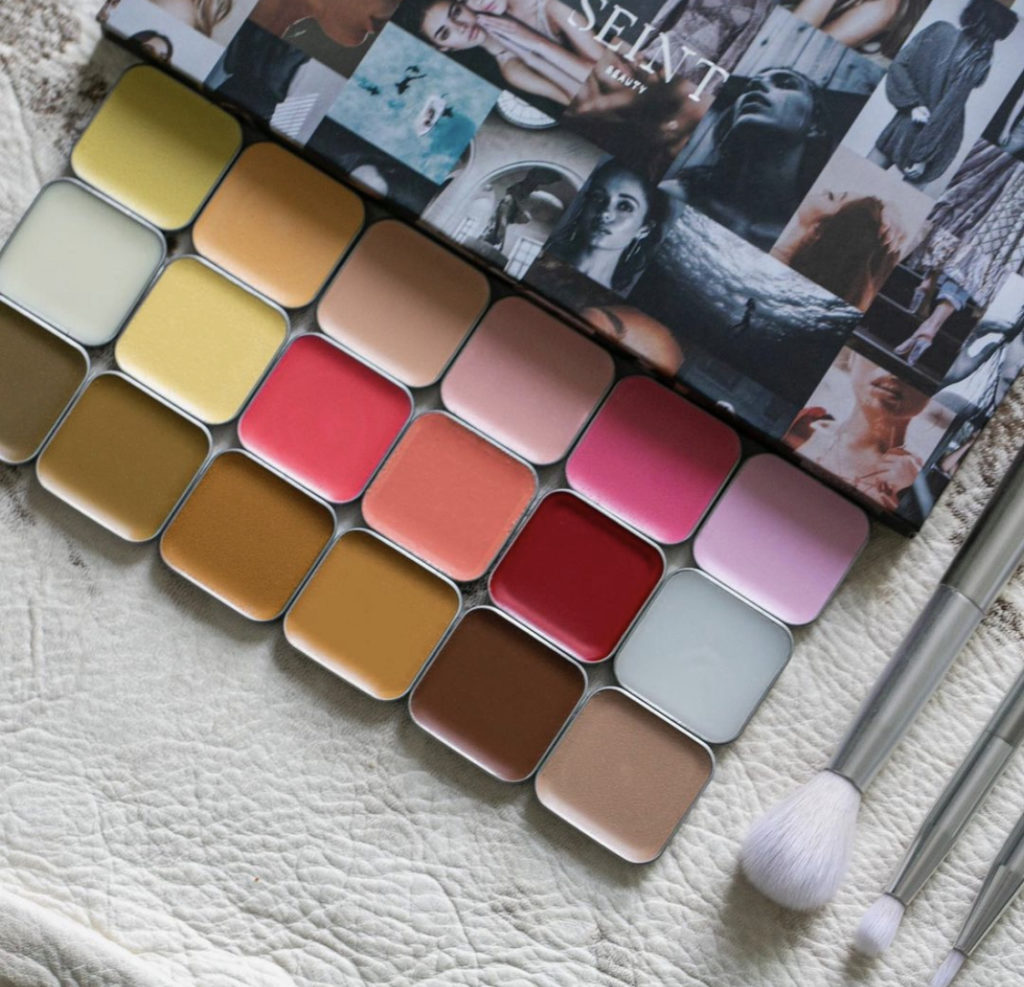
How to Use Demi Corrector to Cover Blemishes
Another technique for covering blemishes with Seint makeup is with their Demi Correctors. Using Seint Demi Correctors to cover a blemish is less about coverage and more about neutralizing the blemish. Demi Correctors are a unique product line that uses color science and color theory to help remove distractions on your skin.
Understanding Demi Correctors
To use Demi Correctors, you need to go back to your kindergarten days and think about the color wheel. The primary colors have complementary colors – yellow with purple, red with green, and blue with orange. So now take that knowledge from the color wheel, and use it to help you start to work with Demi Correctors.
When you start using Demi Correctors, the first thing you want to do is identify the excess colors in your skin. These colors are causing the distraction in the first place – the distraction in this case being your blemish. This can be a little challenging, and you’ll need to be patient with Demi to learn the process. Remember, the goal is to neutralize the blemishes with the right colors. So the key is to identify the excess color in the blemish and then use the opposite color on that area to neutralize it.
But here is where it gets a little tricky. Typically we think of blemishes as red, which will make us want to go right to green. But don’t! A true red is rarely found in the skin unless a blemish is brand new, and in its angry, fiery state still. Most of the time, what you think is red, is typically a deeper and darker shade of red. Meaning, it contains more blue or even purple tones to it. And it is the deeper shades of blue and purple that create the excess color to the blemish that needs to be neutralized. When this is the case, it means that you actually need to use a yellow or orange on the blemish to neutralize those excess colors of blue and/or purple.
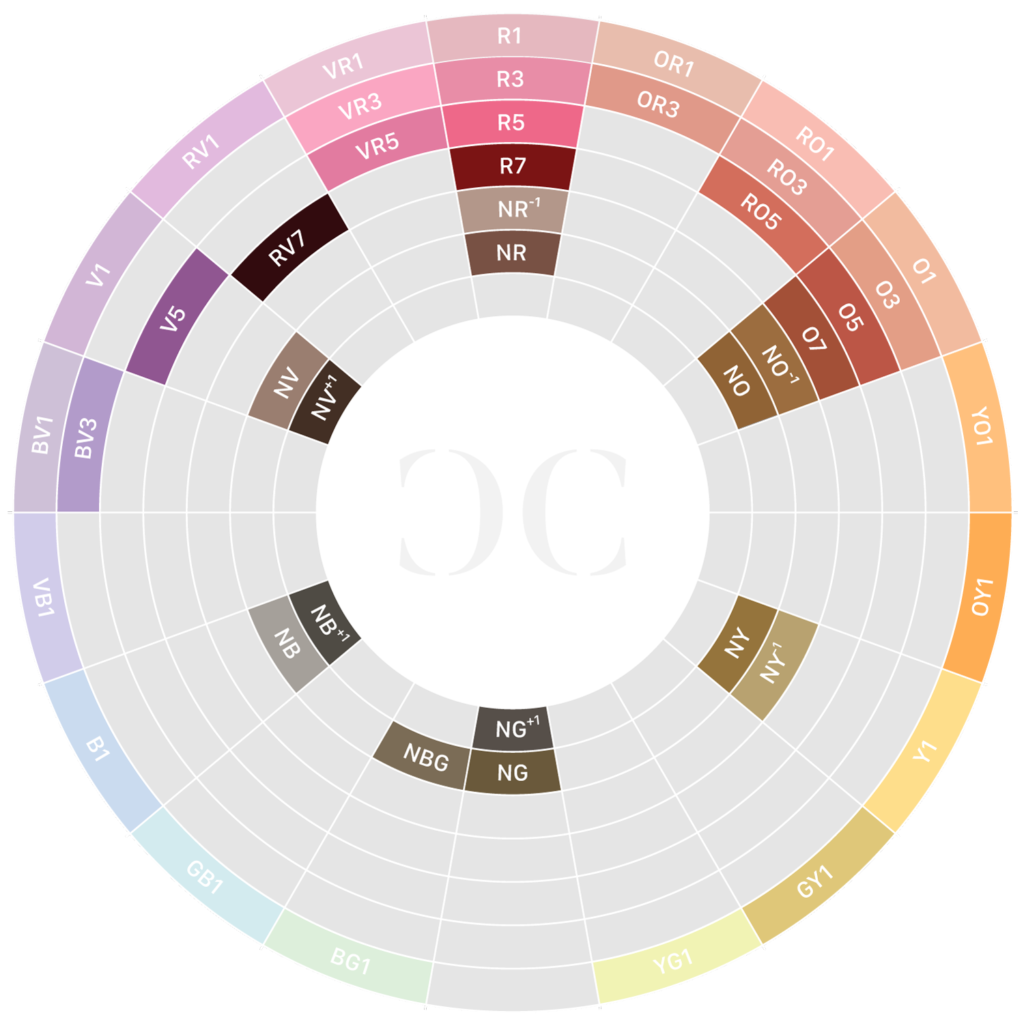
Applying Demi Correctors to Cover Blemishes
As you begin to cover your blemish with Demi Correctors, I highly recommend using the Spot Brush to get the best coverage. Using precision with your Demi application is vital. You must use as little product as possible. Then, only apply it directly on top of the exact spot you are needing to neutralize. So, with the small end of the spot brush, apply the demi corrector right on top of the excess color in the blemish. Then flip the brush to the fluffier end and lightly buff it out. Continue this technique (switching shades if needed) until you have adequately neutralized the entire blemish, and made it disappear into the rest of your skin!
Best Seint Brushes to Cover Blemishes
When applying Seint makeup to cover blemishes or any other small distraction, you’ll want to use smaller brushes that can handle more precise applications. The two brushes that I highly recommend for this would be the multitasker brush and the spot brush.
Multitasker Brush
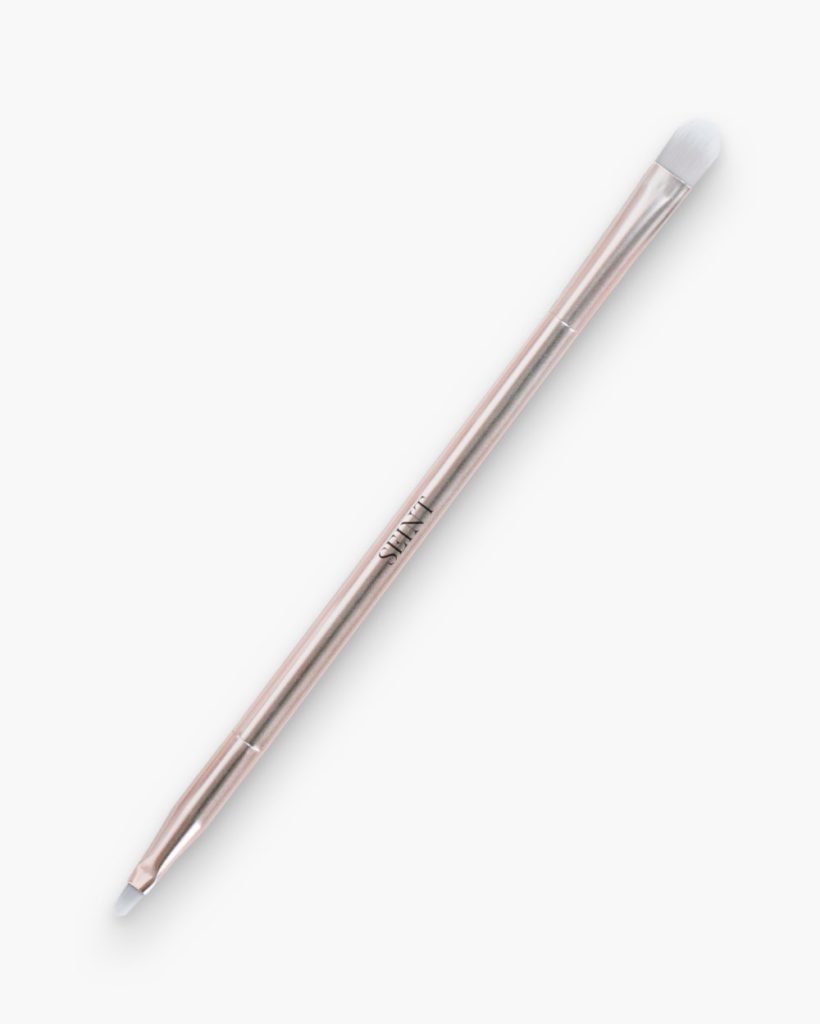
The Multitasker Brush is the tool to use for any small, detailed job. The larger end of the brush is flat and firm, and the small end is ideal for more precise and detailed applications. Just like the name implies, the Multitasker brush is perfect for multiple makeup tasks. It can be used for lining lips, concealing blemishes, filling in eyebrows, contouring the nose, applying eyeshadow, and more.
Spot Brush
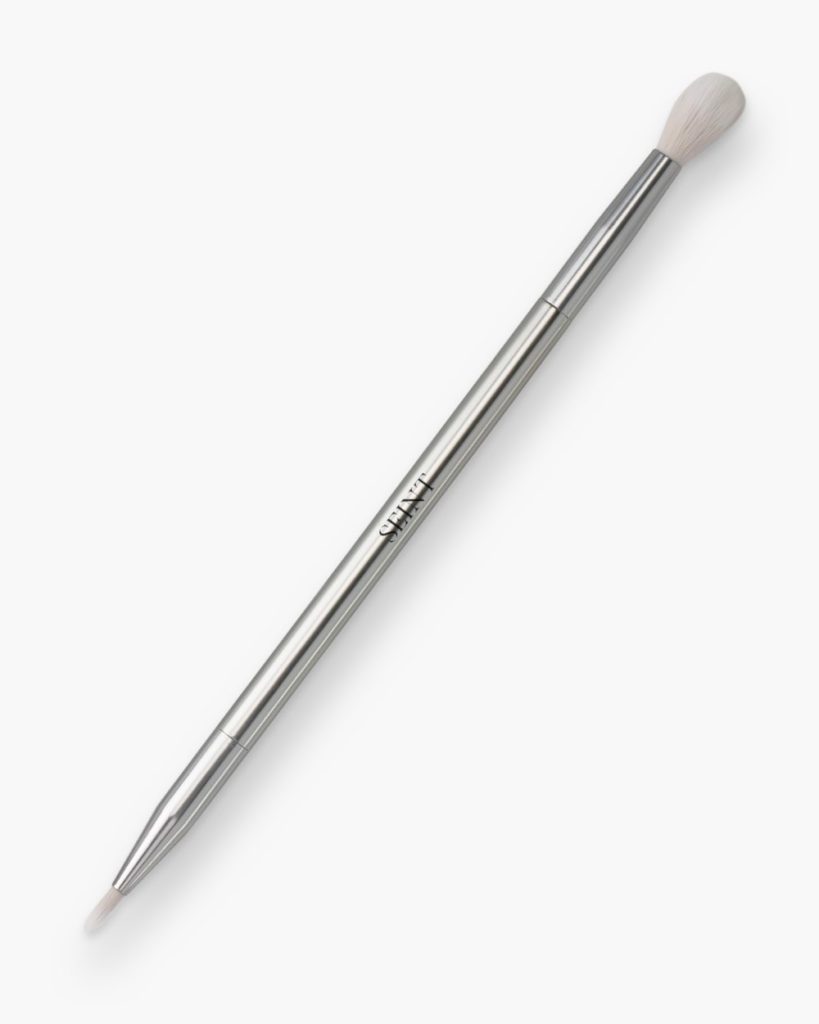
This is the brush I would say is most essential when using Demi Correctors. With the small, pointed end of the Spot Brush, you can pinpoint the specific areas that need to be neutralized. And then you can flip it and use the fluffier side to help buff and blend out any color. This gives you a softer and more seamless finish.
Use Seint Makeup to Cover Blemishes
Learning how to use Seint makeup to cover blemishes is vital for most women. Covering blemishes is something we all want to be able to do, and both of these options for coverage are great choices. Using IIID Foundation is fast, easy, and involves products you likely already have! While Demi Correctors can be tricky to learn, it is well worth the payout of getting a well-covered blemish with a more natural finish.
If you are not already using Seint’s IIID Foundation, be sure to head to HERE and I can color-match you. And if you are interested in learning more about Demi Correctors, be sure to head HERE and HERE to learn more!

